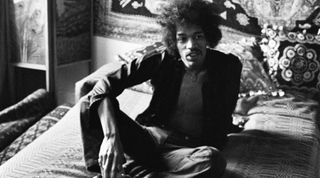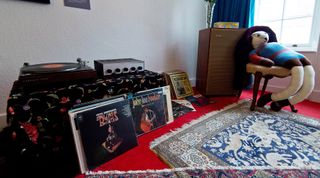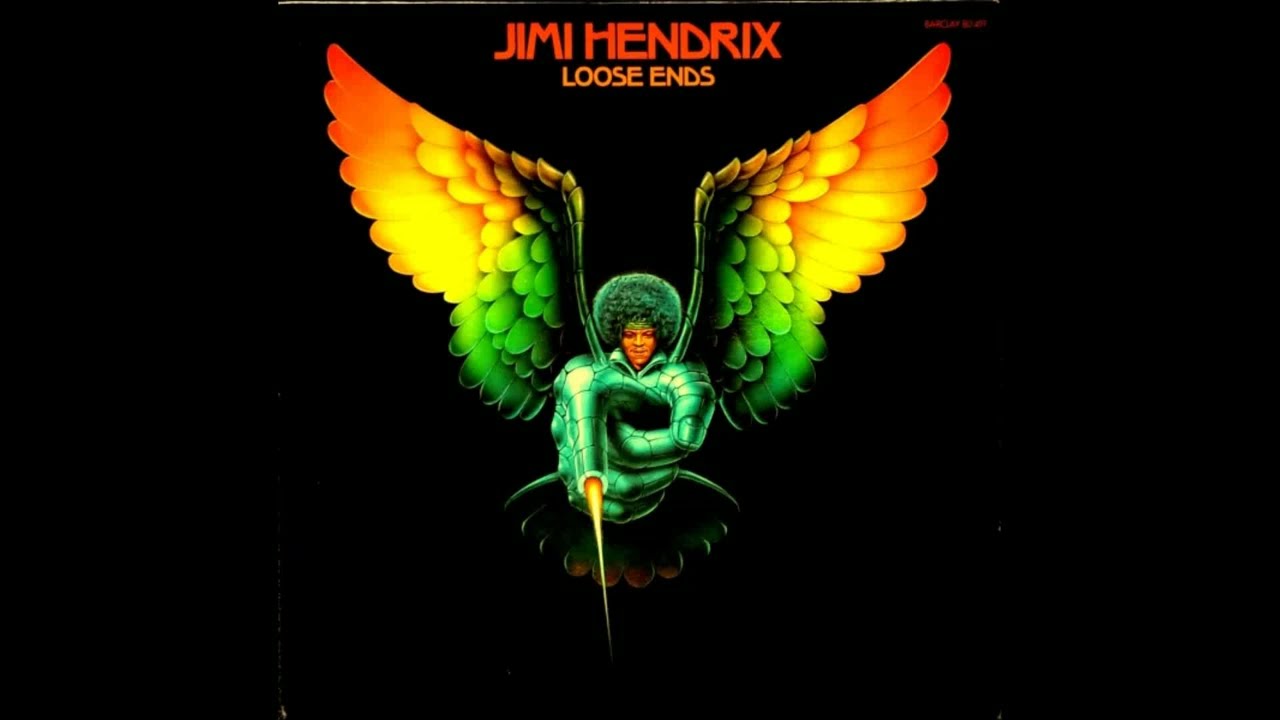If you had to guess what was in Jimi Hendrix’s record collection, what might you imagine? Buddy Guy? Muddy Waters? Bob Dylan? You’d be correct with each of those responses.
As Guitar Player learned when we spoke with Jimi’s former girlfriend Kathy Etchingham-Page in 1996, his collection included those artists and much more.
Etchingham lived with Jimi in various London flats from 1966 to ’69, including one at 23 Brook Street, Mayfair, next door to a house once occupied by George Frideric Handel. There they amassed close to 100 albums, ranging from Chicago blues to folk to classical to complete obscura.
‘”Jimi would buy out of curiosity,” Etchingham remembers. “Often he’d go through the record racks, look at something for a moment and buy it. Then he’d listen to it once and never play it again.”
Many of Jimi’s discs were blues records — not surprising perhaps, given his own music and his status as the late-’60s most influential electric guitar player. She remembers Elmore James as a staple, and, judging from the records he collected, Muddy Waters and Llghtnin’ Hopkins were also big favorites. Testament Records’ Down on Stovall’s Plantation album reissued Muddy’s 1941 and ’42 Library of Congress 78s.

Etchingham clearly recalls Jimi going out of his way to get a copy of Electric Mud. Muddy himself regarded the album as an experiment in psychedelia gone awry, proclaiming, “If you’ve got to have big amplifiers and wah-wahs and equipment to make your guitar say different things, well, hell, you can’t play no blues.”
Jimi’s copy of Waters’ The Real Folk Bluesthough, more than delivered the goods, with classic renditions of “Mannish Boy,” “Screamin’ and Cryin’” and “Little Geneva,” as did his copy of More Real Folk Bluesreleased the following year. Jimi’s passion for Lightnin’ Hopkins is revealed by his collecting the Texas blues great’s Soul Blues, Lightnin’ Strikes, Something Blue, The Roots of Lightnin’ Hopkins and Earth Blues.
His collection’s only John Lee Hooker album, Live at Cafe Au Go-Gowas recorded live in ’66 with the full Waters band, including Muddy on guitar and Otis Spann on piano. Jimi also owned copies of The Best of Elmore James, The New Jimmy Reed Album, Stand Back — Here Comes Charlie Musselwhite’s South Side Band, The Driving Blues of Smokey SmothersSonny Boy Williamson II’s Down And Out Blues and More Real Folk BluesHowlin’ Wolf’s More Real Folk BluesGuitar Slim and Jelly Belly’s Carolina Bluesand the Arhoolie label’s Lowell Fulson. Junior Wells’ It’s My Life, Baby could give him a good dose of primal Buddy Guy whenever needed.

Oddly enough, there were no B.B. King titles among Jimi’s remaining albums — Etchingham reports that many were permanently borrowed — but he did own Albert King’s utterly essential Live Wire/Blues Poweras well as John Mayall’s Blues Breakers with Eric Clapton, Crusade with Mick Taylor, and A Hard Road with Peter Green.
Besides Muddy’s Stovall’s Plantation album, Hendrix’s other prewar blues records were the hard-to-find Bootleg Rum Dum Blues by Blind Blake, Washboard Sam’s Classic BluesSonny Boy Williamson I’s Classic Bluesand Lead Belly’s Take This Hammerwhich was Folkways’ first 10-inch album. Jimi’s blues anthologies were Delmark’s essential Chicago/The Blues/Today! set, as well as American Folk Blues Festival, We Sing the Blues and Original Golden Hits of the Great Blues Singers, Vol. II.
“People will argue with me, but I tell you, that guy was a bluesman,” Kathy insists. “That’s what really got him. That’s where his heart really lay. Anybody who tells me he would have become a jazz musician — well, balls to them.
“The way Jimi was, if he was with a jazz musician he liked jazz, if he was with a folk singer, he liked folk. But what he really liked and what he really played at home was the blues.”
Their collection also boasted one of the Columbia Robert Johnson albums, given to Jirni by Yardbirds manager Giorgio Gomelsky when the pair visited him at Polydor’s Oxford Street offices.
Jimi had a number of interesting and progressive folk albums, such as Sophisticated Beggar by Roy Harper, whose sidemen frequently included Jimmy Page and John Bonham. He also owned Tim Buckley’s 1967 second album, Goodbye and Hellowhich began Buckley’s foray into jazz-tinged, vocal gymnastic folk-rock, and old Greenwich Village buddy Richie Havens’ Electric Havens and Mixed Bag.
Dylan, of course, was a perennial favorite of Jimi’s, and he wore out copies of Bob’s Highway 61 Revisited, Greatest Hits, Nashville Skyline and John Wesley Harding. This latter, notes Etchingham, was brought over from the U.S. and yielded Hendrix’s most famous cover tune, ”All Along the Watchtower.’
“He’d listen to it time and time again,” she recalls. Jirni considered covering “I Dreamed Saw St. Augustine,” but according to Etchingham he deemed it “too personal.” John Wesley Harding was also the source of another Hendrix cover, “Drifter’s Escape.”

The few jazz records that remain in Jimi’s collection include Jimmy Smith & Wes Montgomery’s classic The Dynamic Duo and the Charles Lloyd Quartet’s Journey Withinwhich featured the warm, adventurous tenor sax and flute excursions that made Lloyd popular among both jazz and pop sets in the late ’60s. Jimi was also hip to Boston-based jazz pianist Jaki Byard’s Freedom Together and Sunshine of My Soul. Byard frequently worked with another of Jirni’s favorite jazz artists, the late saxophone iconoclast Rahsaan Roland Kirk.
As for rock and roll? Jimi was an Elvis fan since his youth, and his early rock LPs included Eddie Cochran and Little Richard titles. But otherwise, Hendrix’s supply of fellow pop and rock acts was relatively limited, although he had copies of the Beatles’ Magical Mystery Tour and Abbey Roadthe Rolling Stones’ Their Satanic Majesties RequestJoe Cocker’s With a Little Help From My Friendsand Vanilla Fudge’s eponymous debut featuring their remake of “You Keep Me Hanging On,” which was a huge hit in the U.K. in 1967.
He owned albums featuring past and future jam partners as well, notably Delaney & Bonnie’s Home and the Spencer Davis Group’s Autumn ’66which featured a young Steve Winwood, who’d play organ on Electric Ladyland‘s “Voodoo Child.” The Bonzo Dog Band’s 1968 satirical gem The Doughnut in Granny’s Greenhouse was probably given to him by the Bonzo Band’s Viv Stanshall, and his buddy Eric Burdon probably gave him the copy of the Animals’ The Twain Shall Meet.

The Temptations’ 1969 release Puzzle Peoplewhich featured the smash “I Can’t Get Next To You,” was filed near James Brown’s aptly titled Ain’t It FunkyDr. John’s second album, BabylonCanned Heat’s self-titled 1967 debut, and the Bee Gees’ first album, which Etchingham describe as “one of the first records in the collection. We used to listen to that quite a lot. Jimi thought their harmonies were really great.”
The more esoteric titles in Hendrix’ collection included George Harrison’s 1968 solo album Wonderwall Musica bit of proto-arnbient soundtrack music with some Indian instrumentation. An early supporter of Indian classical music, Rolling Stone Brian Jones, a close pal, gave Jimi copies of Ravi Shankar’s Sounds of the Sitar And karnatak vocalist subbulakshmi's The Sounds of Subbulakshmi.
The collection also included some amazingly oddball artifacts, such The Zodiac: Cosmic Soundsan early synthesizer album featuring Paul Beaver playing original music for each of the astrological signs. Bach on the Pedal Harpsichord was the work of E. Power Biggs, a renowned classical pipe organist, and French electronic music pioneer Pierre Henry was represented by The journey. Even more obscure were Friar Tuck’s Friar Tuck and His Psychedelic Guitar and The Parable of Arable Land by the Red Krayola With the Familiar Ugly.
Kathy remembers that Hendrix was no anal-retentive audiophile.”He was terrible-never put the records back in the sleeves,” Etchingharn says with a laugh. “They were all over the floor, and that’s why they were all so damaged. If he particularly treasured an album, he’d put it away, but otherwise…”
Given all that was in his collection, if you had to take a guess at Jimi’s favorite album, what would it be? Muddy? Dylan?
According to Etchingham, it was Bill Cosby’s comedy LP I Started Out as a Childone of several albums by the now-disgraced comedian she describes as “Jimi’s absolute favorites. He just loved them, and he’d play them for everyone who came by our flat.”
A gifted mimic, Jimi could easily imitate Cosby’s voice, as well as that of British talk-show host David Frost, whose Frost Report on Britain albums were also a source of much laughter during Jimi’s days in London. “Jimi was just getting into English stuff then,” Etchingham recalls, “and by that time he understood the British sense of hum or and the nuances of the language.”
GIPHY App Key not set. Please check settings